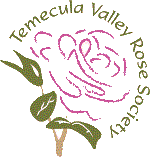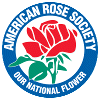Temecula Valley Rose Society
An Affiliate of the American Rose Society



© American Rose Society
ARS Facebook page
Temecula Valley Rose SocietyAn Affiliate of the American Rose Society |
||
 |

|
 © American Rose Society ARS Facebook page |
President's Messageby Virginia Boos Volunteering and fundraising – the 2 big words in my vocabulary right now. Our Board members and assistants have been busy for several months preparing for the Public Gardens Week, attending Chamber of Commerce events, recruiting new members, researching the fundraising possibilities and grants, as well as increasing our social media presence. All this will enable TVRS to maintain our dream of a successful effort in keeping Rose Haven Heritage Garden alive and well long into the future years.
Volunteering and fundraising – the 2 big words in my vocabulary right now. Our Board members and assistants have been busy for several months preparing for the Public Gardens Week, attending Chamber of Commerce events, recruiting new members, researching the fundraising possibilities and grants, as well as increasing our social media presence. All this will enable TVRS to maintain our dream of a successful effort in keeping Rose Haven Heritage Garden alive and well long into the future years.
There is always a place for a volunteer. I encourage our members to offer some of their time and energy which is needed to keep this society moving forward. Right now we are needing someone to take over the Little Rose Show. Another need is for forming a committee to help with the changes we want to make to our By-Laws, Standing Rules and a Mission Statement. Please talk to me about what you can do. Fundraising plans are a Work‑In‑Progress as we take a look at all the possibilities. We had 801 "hits" on our website last month, most for the Rose Haven Garden page, and we are getting more and more publicity. The opportunities are out there. We just need to become familiar with the technology. American Public Gardens Week
|
 A Tussy Mussy |
 Don Nordike's Winning Rose |
Don Nordike took Rose of the Day at the May meeting for his "Let Freedom Ring", a perfect medium red Hybrid Tea introduced in 2005, rated at 7.9. It was a pleasure to see so many entries, 28 in all. It's not easy to transport roses to the meeting, in water, in vases, making that effort truly appreciated by me.
All our members benefit from the display that is presented, both emotionally and educationally. There is always something to be learned, no matter how long we have been rosarians. I was able to identify 3 "unknowns" from members who have roses previously planted at their homes: "Hot Cocoa" and "Firefighter" for Judy Sundermann and "Queen Elizabeth" for Gayle Hansen. Looking forward to our June meeting!
Have you noticed the roses planted in the median strip along Rancho California Rd near Ynez and Hwy. 15? As you can guess, yes, the TVRS membership helped with the project and City employees did the completion. We were right out in the roadway with traffic control protecting us. It was 1991, the Gulf War days. Karen spoke about our soldiers serving there.
In the early years a home tour was held at Edie O'Hair's place in DeLuz. On her 5 acres there were about 3,000 rosebushes of all varieties. A beautiful new redwood gazebo made it special. Members worked tirelessly for weeks to have everything in shape for visitors. We had a shuttle service from town. Food by Katie McGuire's restaurant. It was a delightful event.
The Families in the Garden program is on our yearly hiatus until September, but we are still actively working on projects.
We are currently working with Mr. Michael Sizemore to earn his Eagle Scout award through the Boy Scouts, and Ms. Melissa Wade for her Gold Award in the Girl Scouts.
Mr. Sizemore will be helping put together the shed being installed in the next few months near the Tree of Life. This will be a tremendous help to our program as it is badly needed for maintenance and program storage. It has been a learning process and great experience to date. We are finalizing the details and he is currently fundraising.
Both of these projects will be completed over the summer and before we start our program again. I'm excited to see both these young people succeeding in their goals.
 Dear Members: I trust that you have made a determined effort to use Stater Bros. Scrip/Gift Cards for your everyday normal purchases. Even in these financially difficult times we all must eat. Purchasing a $100 Scrip Card will let you spend $100 for groceries at Stater Bros. There is no extra expense or donation coming out of your pocket and the Rose Society will get a $6.00 donation for the upkeep of the Garden. Your support is greatly appreciated. Email Ann Coakes to order Scrip Cards, or phone 951 693-5635.
Dear Members: I trust that you have made a determined effort to use Stater Bros. Scrip/Gift Cards for your everyday normal purchases. Even in these financially difficult times we all must eat. Purchasing a $100 Scrip Card will let you spend $100 for groceries at Stater Bros. There is no extra expense or donation coming out of your pocket and the Rose Society will get a $6.00 donation for the upkeep of the Garden. Your support is greatly appreciated. Email Ann Coakes to order Scrip Cards, or phone 951 693-5635.Chilli Thrips are microscopic pests which are more prevalent in warmer weather. Gary will help us ID them and help us with an action plan to eliminate them.
A light buffet luncheon will be served at 11:30. Guests are welcome.
| Birthdays Sheryl Johnson 6/24, Tony Merritt 6/3, Sochie Rumbold 6/19, Sandy Starkey 6/30, Patsy Thurman 6/9 |
New Members Susan Deardorff and Mimi Ghofranian |

Summertime in the garden is especially enjoyable right now. The beautiful roses in bloom and all the other wonderful plants are a sight to see. The pond is full of lilies and the picnic area is awaiting your visit.
A highlight this time of year can be seen in the native plant area. One cannot miss the huge white blossoms on the 8 ft. tall Matilija poppy plants and the bright Salvia, shown below. Another photo shows a view of roses and the pond.
"Night of the Luminaries" will be celebrated Saturday, June 22nd. This annual event is so enjoyable and we are excited to show off the garden and meet new visitors. See Rebecca's article for details.
Our next garden committee meeting is Wednesday, June 26 at 10:00. The meeting is at Rebecca's office 31285 Temecula Parkway, Suite 255. We discuss garden improvements and activities. Interested members are always welcome to attend the meeting.
 Salvia & Matilija poppies |
 Spring blossoms |
Click here to see the map to Rose Haven Garden.
How does our garden grow? This year it has grown very well – plenty of rain, a modest amount of fertilizer, and a great deal of tender loving maintenance. Our bloom was exceptional, starting a week or so later because of the cool-ish spring. Before long, though, the bloom will be past and the summer weather will be upon us with our bushes going into summer dormancy.
This period of summer dormancy gives our committee time to plan for the future of the garden. In 2021 we will celebrate our 30th year of growing. We have garden plants in need of replacement, our gazebo in need of repair, and soil in need of replenishment. We are in great need of your ideas, thoughts, and suggestions in determining our direction. Please email us at RoseHavenTemecula@gmail.com.
What other help can you provide? Attend a committee meeting – either on a once in a while basis or as an active member of the committee. We will have two meetings in June. The first meeting will be after refreshments at our Member Meeting on Thursday, June 20th &nash; about 12:30 or so. The second meeting will be on Wednesday, June 26th at 9:30 a.m. Contact me at RoseHavenTemecula@gmail.com for the location of the meeting.
In late April we had a visiting group at Rose Haven. It's called Umbrella Moms which gives support to mothers who are having difficulty coping with the death of a child. They are based in Corona but they found us last year with the help of a Temecula mom. This was their second visit, arranged for the blooming season so they could see the garden in all its glory. Their leader's comment was "It is magnificent!" She said to spell that with a capital M. Bonnie Bell and I were honored to sit with them, listening to their stories and getting to know them as individuals. Bonnie then gave them a tour of our Magnificent public garden!

Ms. Wade is constructing and installing several Native Solidarity Bee houses to earn her Gold Award in the Girl Scouts. These will be located on the upper part of the triangle past the Tree of Life. They are not hive boxes and do not attract colony bees. She will be including educational information on the importance of these native bees and their life. Alica Cline: "I can not wait to incorporate them into our bug program next year."
Rose Care FUNdamentalsby Frank Brines, Master Consulting Rosarian "Gardeners must become water-wise and learn as many ways as possible to use water efficiently. Some water districts may still have restrictions on how and when water can be used for irrigating landscape. Water agencies advise customers to be conservative this year as supply is still limited and even purchasing water from other regions is difficult for the same reasons."
"Gardeners must become water-wise and learn as many ways as possible to use water efficiently. Some water districts may still have restrictions on how and when water can be used for irrigating landscape. Water agencies advise customers to be conservative this year as supply is still limited and even purchasing water from other regions is difficult for the same reasons."
The above paragraph is from a year ago. Although the current precipitation for our areas is 20% to 25% above normal, I encourage gardeners to be as conservative as ever. Agencies haven't constructed water recovery basins to refill aquifers and some aquifers have collapsed and can't be recovered. Much of the recent rainfall just ran off into drainage. The added rain and humidity have encouraged more fungal diseases this year, fungi like powdery mildew, rust and various forms of botritis. There are a few things we can do now to provide some relief for our cherished roses once the weather gets really hot. First, as hot weather approaches, cut back on fertilizing established roses; this will encourage them to slow down for the hot summer. Second, water roses deeply as temperatures rise—that means longer, slower irrigation. Next, hose off roses in the early morning to increase humidity and control spider mites, which are found mostly on the underside of the leaves. A strong forceful spray from below is needed to dislodge them. Then give a downward shower to wash them away. Spider mites usually appear when the seasonal temperatures have been hot. Also, keeping vegetation trimmed to approximately 8 inches from the soil level will help as well. Finally, remove only the petals of the blooms and let the rose hips develop; this brings on a mild dormancy. Typical mature, full-size hybrid teas in Southern California soil require about 6 to 9 gallons of water a week when temperatures are high. As temperatures rise into the 80s, those roses require about 9 gallons of water per week. In the 90s, the rose requires about 12 gallons or more per week. These figures are rough and based on the amount of water needed to maintain the highest level of show quality blooms: A rose can stay alive on considerably less. But during summer heat, I don't even try to have show quality blooms. Use these three strategies for efficiently managing the amount of water you apply in your rose garden: Delivering Water Efficiently: Drip systems provide the most efficient way to deliver water to your roses because such systems don't produce a spray that can be carried away by the slightest breeze, and because they deliver water slowly, allowing it to soak deep into the root zone rather than running off. If you have a drip system, be sure it's in good shape before you go on to the next step and cover it with mulch! Open each irrigation valve one at a time and inspect how it is performing. Repair any leaks, including emitters that are spraying from their attachment point on the tubing—you may have to remove the emitter, insert a "goof plug," and install a new emitter an inch or two away from the original one. My gardening friends are recommending the more efficient drip systems similar to a product called Netafim. This product has pre-placed pressure regulating emitters at different distances apart for your use. Find the information at netafimusa.com. One more thing: You'll want to estimate the volume of water the system is delivering so you can better manage your use. For example, if every rose has two emitters, which it should have in the typical drip line system that, deliver 8 liters (about 2 gallons) per hour, then to deliver 4 gallons to the plant you'll need to run the system for an hour. This should work well in a typical loam soil. You want the water to soak down at least 12" for optimal rose health. A loam soil doesn't allow water to just run through it, so irrigating for an hour at a time can be fairly efficient. On the other hand, if your soil is particularly sandy – which allows water to permeate more quickly – an hour of irrigation may waste some of that water, and you might be better off running the system twice a week for half as long. Experiment! After all, gardening is a scientific pursuit. |
Mulch: If you have read my past columns you know that I have been advocating the application of a deep layer of mulch for years. Mulch provides many benefits. It moderates the soil temperatures, retains moisture and allows it to spread more uniformly throughout the root zone, discourages weeds, and maintains a soft soil surface while enriching the soil nutrients and bio mass. A four inch layer of mulch is recommended. I highly suggest composted mulch. There are many materials you can use, and you might want to experiment with a variety of them, but you will probably get the best results if you don't mix them in any one garden bed. One material that some gardeners have in abundance is pine needles. They provide an airy cooling barrier and break down very slowly to impart a more acidic soil environment which makes mineral nutrients more available to plants. Another material is any size of wood chip specifically intended as mulch; I recommend the finer cut forms. Possible drawbacks: if not specifically manufactured for garden use is the potential for matting due to fungal growth, which can make the wood chip layer impermeable to water: the need to apply added nitrogen to break down the wood fibers. I'm not an advocate for the dyed wood products. I prefer composted mulch that is light and fluffy (so it doesn't pack down) and contains a higher proportion of hummus (so it slowly integrates with and enriches the soil). One drawback of composted mulch is that after several years you may find that your garden soil level has risen. If this ends up burying the bud unions, it can be helpful to "lift" the rose – essentially, digging to release a large root ball, levering it up, filling in several inches of good garden soil beneath it, and then resetting the root ball in the hole or maintain a clear well around the base of the bush. Whatever mulching material you choose, be careful to NOT apply it up to or over the bud union. Leave an area around the base of the plant of about 12" diameter. (If you can maintain that distance, then as your composted mulch disintegrates it will not raise the soil level around the bud unions.) An edging material can be formed into rings that will assist in preventing mulch covering bud unions. Summer Dormancy: Allowing your roses to go dormant during the hot summer months will reduce water use as well as the stress on your plants. You won't be missing out much because if you allowed your roses to power through the summer, most blooms would be of poor quality and have burned petals and leaves. So as your roses complete the current bloom cycle, remove only the petals as the flowers fade—do not deadhead them—that is, allow hips to form. This will discourage new growth and flower formation, thus reducing demand for water. Remove any fallen leaves and discard them along with the petals into your green yard waste bin—do not compost them! (It is always a good practice to keep the garden clean in order to reduce fungal diseases and insect pests, particularly in hot dry weather.) Do not remove burned leaves because they provide shade for the cane which can be damaged or killed by sunburn! Discontinue your feeding program—we do not want to encourage growth at this time because it will only stress the bush more. In summary, until at least September: Potted plants will require more diligent watching, resources and attention to what they are experiencing during this period. Learn to listen to your plants and observe their reaction to the elements. Doesn't look like much work, right? Well, since you'll be taking it easy or the summer, go visit Rose Haven, located at 30592 Jedediah Smith Rd., Temecula. For more ideas, visit TVRS' Rose Haven garden located at 30592 Jedediah Smith Rd., Temecula, at the corner of Cabrillo Avenue and Jedediah Smith Rd., Temecula, as well as our web site at TemeculaValleyRoseSociety.org. Spread the joy of roses! Jump to page top. |
TVRS C A L E N D A Rfor 2019 | |
|
TVRS Members Meeting Ronald H. Roberts Public Library, Community Room B, 30600 Pauba Rd., Temecula (Google map) 3rd Thursday of the month. No meeting in July. From 10:15 a.m. to 1:00 p.m. TVRS Board of Directors Meeting The Board meeting locaton is at Atria Vintage Hills, 41788 Butterfield Stage Rd., Temecula 2nd Thursday of the month. No meeting in July. From 10:00 a.m. to Noon. Rose Haven 3rd Saturday Garden Workshop 30592 Jedediah Smith Rd., Temecula, at the corner of Cabrillo Avenue and Jedediah Smith Rd. (Google map) 3rd Saturday. No meeting in July, August & December. From 9 a.m. to 11:00 a.m. |
Rose Haven Garden Committee Meeting 30592 Jedediah Smith Rd., Temecula, at the corner of Cabrillo Avenue and Jedediah Smith Rd. (Google map) 4th Wednesday of the month (except July, November & December). From 9:30 a.m. to 11 a.m. Little Rose Show Competition at the monthly Member Meeting Apr, May, June, Sept, Oct, Nov. To see entry and judging criteria go here Gardening for Kids in Temecula & Murrieta (this links to Facebook) Programs for youth 12 & under held on 3rd Sat from 9:30 a.m. to 11 a.m. For more information contact Alicia Cline. Activities for 13 & older are coordinated by Barb Purdy. Other Committee Meetings will be announced separately. To see other events on our Society's Event Calendar click here. |
|
2019 Officers & Directors All Directors and Officers can be contacted here: By phone at (951) 526‑7436 or by email at RosehavenTemecula@gmail.com |
|||
|
Officers |
Directors |
||
Thank You to Our Friends• Erin's Tree Service • Pechanga Resort and Casino Grants • Corona Tools • Armstrong Garden Center • Agriscape of Murrieta • City of Temecula • CR&R Disposal • Nutrien Ag Solutions • Riverside County 3rd District • Stater Bros. Market • Weeks Roses |
This newsletter is web-published monthly for members. TVRS is a 501(c)(3) non-profit corporation dedicated to the purpose of encouraging the appreciation, study, and culture of roses. Members are encouraged to join our affiliate, the American Rose Society, at www.rose.org. Our monthly Member meeting is held the 3rd Thursday of the month (excluding July and August) at 10:00 a.m. at the Ronald H. Roberts Public Library, Community Room B, 30600 Pauba Rd., Temecula. A light lunch is served at 11:30, and guests are welcome.Our mailing address is Temecula Valley Rose Society PO Box 890367 Temecula, CA 92589-0367. Do not send any mail to Rose Haven Garden on Cabrillo Ave. There is no mail box there.For more information about our sponsors go here. For additional information please visit our web site at temeculavalleyrosesociety.org/ |